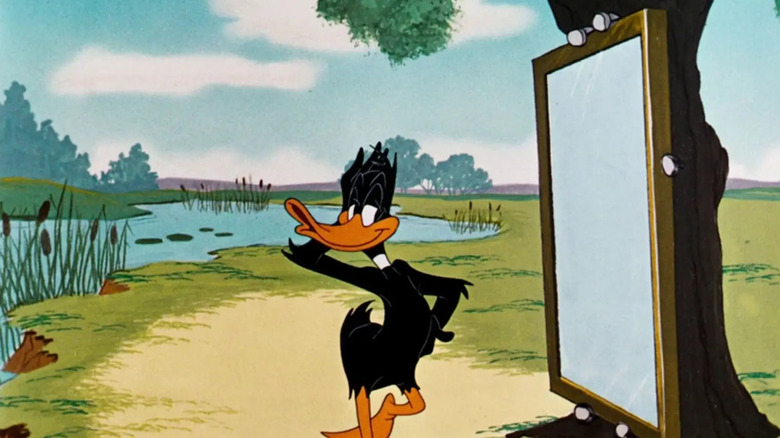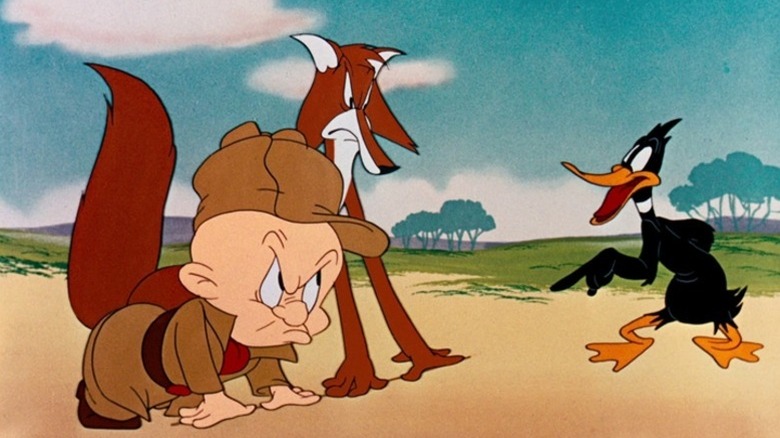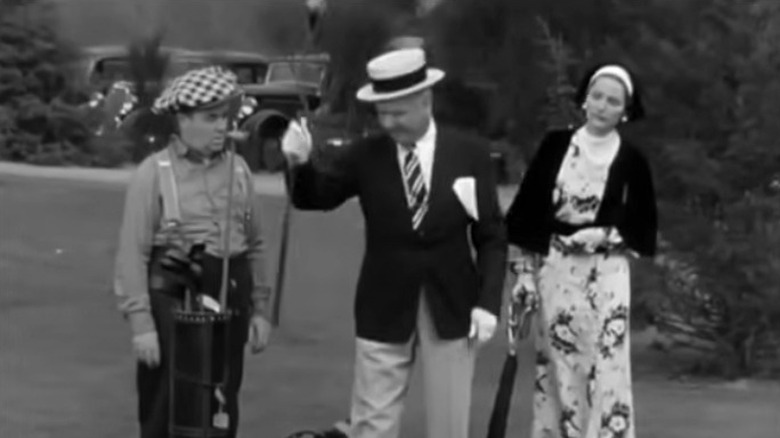How Daffy Duck (Not Bugs Bunny) Turned A Noble, Heroic Name Into A Devastating Insult
The term "Nimrod" is, in the 21st century, something of an insult. In practice, it's used to describe a clownish, clumsy, or wimpy person à la "dweeb" or "nerd." This is a strange connotation for the term, as many will be able to tell you that Nimrod is the name of a powerful and terrifying character in the Book of Genesis. Nimrod was the king of the Land of Shinar and is described in the Bible as a mighty hunter, but also a tyrant. He is said to be the one who oversaw the construction of the Tower of Babel, making him a symbol for the defiance of God's will. Nimrod isn't an actual historical figure, but he was perhaps extrapolated from several ancient kings.
Although not always having rosy associations, the name "Nimrod" came to be associated with power and hunting prowess. For many decades, hunters were called Nimrods as shorthand, and the name was given to symphonies and ships. In 1899, Edward Elgar called one of his celebrated Enigma Variations "Nimrod," and in 1909, explorer Ernest Shackleton, on his expedition to the South Pole, named his ship the Nimrod. Heck, even by 1965, the term was being taken seriously as a symbol of power; a company called Ward Industries manufactured a line of campers called Nimrods. The Unremembered website documents some of the details.
By the 1970s, however, the term had become a common insult, and we may have Daffy Duck to blame. In Arthur Davis' 1948 animated short "What Makes Daffy Duck," Daffy (voice acting legend Mel Blanc) playfully referred to the buffoonish Elmer Fudd (Arthur Q. Bryan) as "my little Nimrod," as a condescending and sarcastic way to describe his lack of hunting prowess. The term's history can be found detailed in a Name-Pop article from 2023.
Daffy wasn't the first to use 'Nimrod' as an insult, but he popularized the practice
It's worth remembering that Looney Tunes and Merrie Melodies from the 1930s to the 1950s made their way into Saturday morning TV rotations decades later, ensuring that multiple generations of kids would get to see them. It's likely that "What Makes Daffy Duck" was in the rotation, and his use of the term "Nimrod" struck a chord with contemporary viewers. "Nimrod" was already being accepted as a general term for a fool. After Daffy Duck, there was no rescuing it. In the short, Daffy uses his zany nature and wits to foil the hunting attempts of both Elmer Fudd and an angry fox named Fortescue.
Of course, Daffy's use of "My little Nimrod" as a condescending insult to a would-be hunter may actually be a reference to the 1947 film "Unconquered." In that movie, Gary Cooper is leading a skittish Paulette Goddard through the woods when she's startled by a wolf howling. The pair search for the source of the howl, only to find a small, cute puppy. "There, my little Nimrod, is your wolf," Cooper tells his companion. Because the writers of Looney Tunes loved to drop in film references, it's more than likely that Daffy was quoting Cooper in "What Makes Daffy Duck."
There had been rumors for years that it was actually Bug Bunny who first referred to Elmer Fudd as a Nimrod, and some still may be operating under the misapprehension that Bugs originated the phrase. Indeed, some claim that it originated in the 1940 Tex Avery short "A Wild Hare." However, if you actually watch that short, you'll note that Bugs doesn't say the phrase at all. He merely outwits Elmer Fudd in his usual way.
The insult 'Nimrod' goes back far further than Daffy Duck
Bugs Bunny did eventually use the term "Nimrod" as an insult, but it wasn't until the 1951 short "Rabbit Every Monday." There, he used it to insult Yosemite Sam.
Daffy Duck and Gary Cooper, of course, weren't the first to use "Nimrod" as an insult. One can find plenty of older references in media. In the 1940 film "His Girl Friday," for instance, a character hears that the governor cannot be reached because he's out duck hunting. They respond by calling the governor a "blasted Nimrod." Even earlier, in Erle C. Kenton's 1934 comedy "You're Telling Me," a bloviating optometrist named Sam Bisbee (W.C. Fields) spends a scene bragging about his golfing prowess. He swings a club and finds it to be rubbery and unusable. "Little too much whip in that club, Nimrod," he says. The Name-Pop website tracks the origin of the insult "Nimrod" to a 1932 play called "The Great Magoo" by playwrights Ben Hecht and Gene Fowler.
All of the above examples are, of course, meant to be taken ironically. It's the same way one might refer to a failed lover as a "Romeo" or to a bumbling individual as "Einstein." In the late 1970s and early 1980s, the term began to mutate into a general term for an incompetent person, all derived from the above usages (and other media appearances as well). The word "Nimrod" still occasionally turned up as a descriptor as a great mythic hunter — an evil Mutant-hunting robot from the "X-Men" comics used the term, for instance — but it was now mostly as a pejorative. Daffy wasn't the first, but he may have codified the term for '80s kids.
Isn't language fun?


